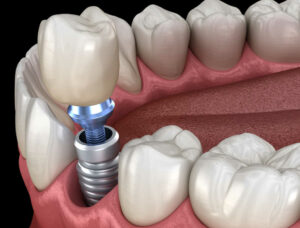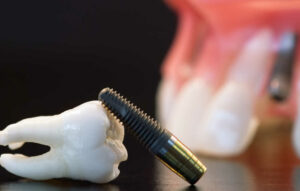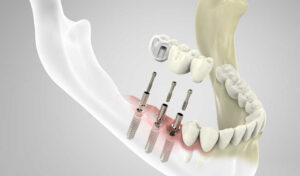How Long do Dental Implants last?
Dental implants are a popular and effective solution for replacing missing teeth. They are designed to be a long-lasting solution, but how long can you expect your dental implants to last? In this blog post, we will explore the factors that determine the lifespan of dental implants and provide some tips for maximizing their longevity.

What are Dental Implants?
Dental implants are artificial replica of tooth roots that are placed in the jawbone to support a replacement tooth. They are made of biocompatible materials, typically titanium, which fuses with the jawbone to provide a stable foundation for the replacement teeth. Dental implants can be used to replace a single tooth, multiple teeth, or even a full arch of teeth.
Factors That Affect the Lifespan of Dental Implants
Several factors can influence how long dental implants last. Some of the most important factors include:
- Oral hygiene: Good oral hygiene is essential to prevent infection and inflammation around the implant. If the implant site is not kept clean, it can lead to peri-implantitis, which is an inflammatory condition that can cause implant failure.
- Maintain the remaining teeth: Its crucial to maintain the remaining teeth to prevent excessive forces on the implant tooth, especially in single implant or short span bridge cases.
- Quality and quantity of jaw bone: The dimensions and density of the jawbone can affect the longevity of a dental implant placed. In cases where the bone is deficient in either of the two attributes proper planning and measures need to be employed by the treating dentist to ensure long term success of the planned implant restoration.
- Patient health: Certain medical conditions such as diabetes and osteoporosis can affect bone healing and increase the risk of implant failure.
- Smoking: Smoking is a major risk factor in the early failure of dental implants.
- Implant overload: Excessive pressure or stress on the implant, such as clenching or grinding teeth, can cause the implant to fail.

What is the Lifespan of dental implants?
The lifespan of dental implants can vary depending on the factors mentioned above. However, with proper care, dental implants can last for many years, even decades.
Studies have shown that the success rate for dental implants is around 95%. Long term success depends upon the above mentioned factors. An implant clinician will come across many patients where the implants were done over 20 years ago and still providing good function.
It’s worth noting that the lifespan of dental restorations (such as the crowns or bridges placed on the implants) may differ from the implants themselves. Over time, the restorations may require replacement or repair due to wear and tear.
Tips for Maximizing the Lifespan of Dental Implants
To maximize the lifespan of your dental implants, it is important to follow these tips:

- Practice Good Oral Hygiene: Just like natural teeth, dental implants require good oral hygiene. Brush twice a day and floss at least once a day to remove plaque and food particles from around the implant.
- Avoid smoking: Smoking significantly increase the risk of implant failure.
- Eat a healthy diet: A diet that is rich in nutrients can help promote good oral health.
- Avoid Hard or Sticky Foods: Hard or sticky foods can put excessive pressure on your implants, leading to damage or even failure.
- Visit Your Dentist Regularly: Regular dental checkups are important to ensure your implants are being taken care of. Your dentist can identify any issues early on and provide the necessary treatment to prevent them from getting worse. If you experience any pain or discomfort around your dental implant, contact your dentist right away.
- Wear a Nightguard: If you grind your teeth at night, wearing a nightguard can protect your implants from excessive force and pressure. Your dentist will prescribe it if they feel the need.
- Follow Maintenance Instructions: After implant tooth placement, it’s important to follow your dentist’s instructions for tooth care.
In conclusion, dental implants can be a long-lasting solution for replacing missing teeth, the success and longevity of dental implants depend on various factors, and individual experiences may vary. Your dentist or implant surgeon will provide you with personalized information based on your specific circumstances, so that you can enjoy a healthy, beautiful smile for many years to come.



